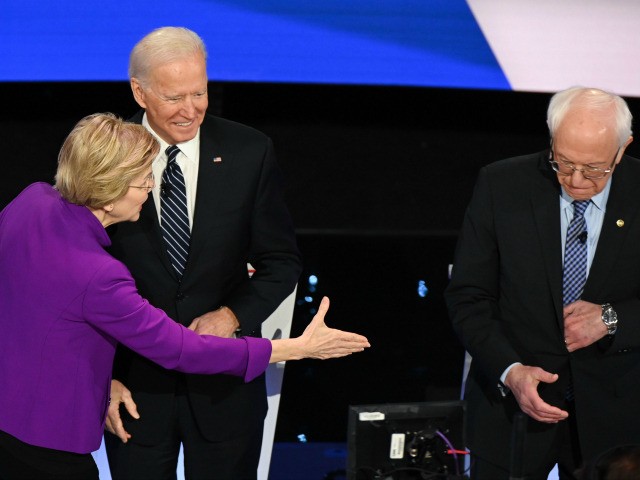Former Vice President Joe Biden is extending an olive branch to his one time rival, Sen. Elizabeth Warren (D-MA), as establishment Democrats look to unify the party and bring the nominating contest to an early conclusion.
On Friday, during a virtual town hall with voters in Illinois, Biden announced a major policy shift on bankruptcy reform. While speaking about the burgeoning Coronavirus threat, the former vice president argued that any plan to alleviate the pandemic’s economic impact would have to include an overhaul of personal and student loan bankruptcy laws. Biden did not stop there, though, stating the proposal he had in mind was the same one Warren championed during her failed White House campaign.
“I’m going to endorse Elizabeth Warren’s bankruptcy proposal, which … allows for student debt to be relieved [and] provides for a whole range of other issues that allows us to, in fact, impact how people are dealing with their circumstances,” the former vice president said. He added it was position he likely shared with his progressive rival, Sen. Bernie Sanders (I-VT).
The political significance of the endorsement was not immediately clear, as much of the news emanating from the town hall focused on its repeated technical difficulties. It does, however, signal that Biden is removing a longstanding point of contention between himself and Warren, likely part of an effort to secure the Massachusett Democrat’s backing.
Biden’s courting effort is hinted at by his newfound support for Warren’s bankruptcy proposal, which is nothing short of a repudiation of the Bankruptcy Abuse Prevention and Consumer Protection Act of 2005. That legislation, written in part by Biden, tightened regulations making personal and student loan bankruptcy more difficult. It is widely seen to have benefited credit card companies and big banks at the expense of the average consumer. Some, including Warren, have suggested the law hastened and aggravated the recession of the late 2000s.
The story, though, goes much deeper. In 1999, Biden was one of the lead backers of an initial bankruptcy reform package that held many of the provisions that would eventually end up in the 2005 bill. The legislation was a top priority for the banking and credit card interests, specifically MBNA Corp., which at the time was Biden’s largest campaign contributor.
Biden, along with a cadre of business-friendly Democrats and Senate Republicans, labored to pass the bill in the face of opposition from liberals and consumer advocates. Among those on the opposing side was then-Harvard law professor Elizabeth Warren, a bankruptcy expert. In opposing the bill, Warren argued the it favored companies like MBNA over working families.
After an intense back and forth, Biden’s side prevailed and the bill passed in late 2000. It did not become law, however, as then-President Bill Clinton opted to pocket veto the measure on his way out of office.
Biden and his allies were not dispirited by the bill’s failure, instead seizing the opportunity presented by the incoming Republican administration to pass a measure even more beneficial to banking interests. Those efforts ultimately led to the 2005 bill, which only passed after MNBA and other financial giants bankrolled an intense lobbying campaign. The following year, results were evident when bankruptcy filings fell by more than 70 percent.
Warren, for her part, has not forgotten Biden’s role in the affair. “At a time when the biggest financial institutions in this country were trying to put the squeeze on millions of hardworking families, Joe Biden was on the side of the credit card companies,” she said the day after the former vice president entered the 2020 race.
Despite the decades-old disagreement, Biden and allies within the Democrat establishment seem to believe an endorsement by Warren is the key to wrapping up the primary. Hopes for a quick conclusion have only grown among establishment Democrats, who fear prolonging the nominating contest will only serve to wound the former vice president in the general election. As such, Warren’s endorsement could prove critical to unifying the party and sapping any remaining momentum Sanders has to fight on.
“Sanders would lose a good chunk as a Warren endorsement would signal to progressives that Biden is okay to support,” Colin Strother, a Texas-based political strategist, told Breitbart News. As proof, he pointed to recent polling indicating Sanders narrowly edging out the former vice president as the second choice among Warren supporters.
“A Warren endorsement may not result in a huge bump, but the signal would be deafening: Biden is the unity candidate,” he said, noting that a large contingent of Sanders’ “supporters are not really Democrats and do not even identify” as such.
Strother added that Biden’s recent actions seemed to imply his campaign had opened up a dialogue with the Massachusetts senator.
Although it is unclear if those talks will be successful, Warren at least appears willing to listen. One day before the former vice president endorsed her bankruptcy proposal, Warren’s allies floated to The New York Times that she was unlikely to endorse Sanders, especially as his chances for winning appeared grim.
“Why would she want to make her endorsement seem less powerful by giving it to somebody on a downward trajectory,” one of Warren’s allies told the Times.

COMMENTS
Please let us know if you're having issues with commenting.